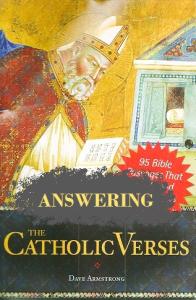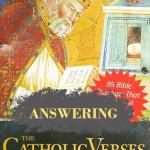Also: the Ten Commandments in the New Covenant; Church Fathers On the Binding Nature of the Council of Nicaea
[see book and purchase information for The Catholic Verses]
“excatholic4christ” (Tom) was raised Catholic, lost his faith in high school, attended Mass for a while after he married and had children, and then “accepted Jesus Christ” as his Savior, leading to his sole attendance at an independent fundamental Baptist church for eight years. He claims that the “legalism” of this church and the fact that his “trust had been in men rather than God” caused him to “walk away from the Lord for 23 years.” He “returned to the Lord” in 2014. As of April 2020, Tom stated that he was “somewhere in the middle of the Calvinism-Arminianism debate,” but “closer to Calvinism.” I couldn’t determine his denomination. See Tom’s index of all of his replies. I will now systematically refute them. His words will be in blue. When he cites my words, they will be in black. I use RSV, unless otherwise specified.
*****
This is a reply to Tom’s article, The Binding Authority of Church Councils? (8-20-18).
Acts 15:28-29 For it has seemed good to the Holy Spirit and to us to lay upon you no greater burden than these necessary things: [29] that you abstain from what has been sacrificed to idols and from blood and from what is strangled and from unchastity. If you keep yourselves from these, you will do well. Farewell.
Acts 16:4 As they went on their way through the cities, they delivered to them for observance the decisions which had been reached by the apostles and elders who were at Jerusalem.
Armstrong writes, “These passages offer proof that the early church held to a notion of the infallibility of church councils, and to a belief that they were especially guided by the Holy Spirit (precisely as in Catholic Church doctrine concerning ecumenical councils). Accordingly, Paul takes the message of the conciliar decree with him on his evangelistic journeys and preaches it to the people. The Church had real authority; it was binding and infallible.” – p. 7.
The council of Jerusalem upheld the Gospel of grace and ruled against the Judaizers who were attempting to add obedience to the Law as a requirement for justification.
Yep. Isn’t it great? Bravo!
It was the Catholic church that eventually did formulate a false gospel that required obedience to the Ten Commandments (impossible!) as a requirement for justification.
It can hardly be false, since our Lord and Savior and Redeemer Jesus Christ taught the same thing:
Matthew 19:16-19 And behold, one came up to him, saying, “Teacher, what good deed must I do, to have eternal life?” [17] And he said to him, “Why do you ask me about what is good? One there is who is good. If you would enter life, keep the commandments.” [18] He said to him, “Which?” And Jesus said, “You shall not kill, You shall not commit adultery, You shall not steal, You shall not bear false witness, [19] Honor your father and mother, and, You shall love your neighbor as yourself.”
Obtaining eternal life (i.e., being eschatologically saved) is even more of a gift and blessing than being justified. This man asked Jesus how he could do that. Jesus didn’t say, “have faith in Me alone!” He told him that he had to “keep the commandments” if he wished to “enter life” (in context, clearly eternal life, because that was the man’s question). Then Jesus actually cites five of the Ten Commandments given to Moses on Mt. Sinai. It’s all quite clear enough.
But then ol’ Tom comes along and thinks he knows better than Jesus does about how one is saved. He objects to Jesus’ teaching as a “false gospel” (and further lies about Catholicism supposedly inventing Jesus’ teaching above). Moreover, he deems it to be “impossible!” to observe the Ten Commandments, whereas Jesus obviously thought it was quite possible, since He commanded it as required for eternal life. Someone’s gotta be right and someone wrong, since these two positions are absolutely contradictory. If the choice is Tom or Jesus, I choose — as I always have done and will do — my Lord Jesus. Jesus also stated the following related thought in His sermon on the mount:
Matthew 5:19-20 Whoever then relaxes one of the least of these commandments and teaches men so, shall be called least in the kingdom of heaven; but he who does them and teaches them shall be called great in the kingdom of heaven. [20] For I tell you, unless your righteousness exceeds that of the scribes and Pharisees, you will never enter the kingdom of heaven.
Again Tom oddly holds that it is “impossible!” to be obedient to the Ten Commandments. Really?! That would come as a big surprise to the priest Zechariah and his wife Elizabeth. Inspired, inerrant Holy Scripture describes them as “righteous before God, walking in all the commandments and ordinances of the Lord blameless” (Lk 1:6; cf. other “blameless” men: Noah [Gen 6:9]; King David [2 Sam 22:24]; King Asa [2 Chr 15:17]; Job [Job 1:1, 8; 2:3], and Daniel [Dan 6:22]). And all of this was even before Jesus died on the cross for our salvation and before the Holy Spirit came to dwell inside of all believers! St. Paul also states in agreement with Jesus:
1 Corinthians 7:19 For neither circumcision counts for anything nor uncircumcision, but keeping the commandments of God.
St. John also concurs:
1 John 5:2-3 By this we know that we love the children of God, when we love God and obey his commandments. [3] For this is the love of God, that we keep his commandments. And his commandments are not burdensome.
St. John informs us that not only is it not “impossible!” to follow God’s commandments, but that — to the contrary — they “are not” even “burdensome.” So now it’s Jesus, Paul, and John against Tom. St. John states again that persons exist who can indeed “keep the commandments of God” (Rev 12:17; repeated word for word in 14:12). Oh the agony as we squirm and writhe and decide whose teaching we will follow: that of Tom, or the truths taught by Jesus, St. Paul, and St. John: all arrayed and in agreement against him. Tom’s serious error is called antinomianism.
Like the Pharisees before them, the 1st century Judaizers were the forerunners of Catholic legalism.
Nonsense. The Judaizers were teaching, “Unless you are circumcised according to the custom of Moses, you cannot be saved” (Acts 15:1). The Catholic Church has never taught that. Tom has no idea what he is talking about.
Armstrong misses the great irony in these passages. The council of Jerusalem ruled against the very kind of salvation legalism that he and his church propagate!
I don’t see how. Tom doesn’t document any such alleged state of affairs. Like the typical anti-Catholic polemicist, he simply makes bald accusations, knowing that most of his readers will gobble them up unquestioningly. The Jerusalem Council ruled (Acts 15: 28-29) that Gentiles were no longer required to abide by the Jewish ceremonial law (circumcision, ritual washings, dietary laws, etc.). Jesus, Paul, and John were all referring to keeping the moral precepts of the Ten Commandments. The Catholic Church has never required its followers to be bound by Old Testament Jewish ceremonial and procedural laws. Paul, accordingly, made it very clear that circumcision was no longer required. And he argued that baptism in effect replaced it (Col 2:11-13). Tom’s charge is ludicrous and lacking in any substance.
The Catholic church argues that Peter was the pope of the early church, yet it was James, the half-brother of Jesus (Catholics claim he was Jesus’ cousin in order to preserve the belief in Mary’s perpetual virginity), who issued the final ruling at the Jerusalem council.
*
But the word of the Lord which came through the ecumenical Synod at Nicea, abides forever. (Synodal Letter to the Bishops of Africa 2; NPNF 2, Vol. IV)
I thought that all vain talk of all heretics, many as they may be, had been stopped by the Synod which was held at Nicæa. For the Faith there confessed by the Fathers according to the divine Scriptures is enough by itself at once to overthrow all impiety, and to establish the religious belief in Christ. . . . How then, after all this, are some attempting to raise doubts or questions? (Letter LIX to Epictetus, 1; NPNF 2, Vol. IV)
Whence did it occur to you, sirs, to say that the Body is of one Essence with the Godhead of the Word? For it is well to begin at this point, in order that by shewing this opinion to be unsound, all the others too may be proved to be the same. Now from the divine Scriptures we discover nothing of the kind. For they say that God came in a human body. But the fathers who also assembled at Nicæa say that, not the body, but the Son Himself is coessential with the Father, and that while He is of the Essence of the Father, the body, as they admitted according to the Scriptures, is of Mary. Either then deny the Synod of Nicæa, and as heretics bring in your doctrine from the side; or, if you wish to be children of the fathers, do not hold the contrary of what they wrote. (Letter LIX to Epictetus, 4; NPNF 2, Vol. IV)
My own opinion is that the following conditions are such as will not run counter to your own feeling and will be quite sufficient to satisfy the above mentioned brethren; namely, that you should confess the faith put forth by our Fathers once assembled at Nicæa, that you should not omit any one of its propositions, but bear in mind that the three hundred and eighteen who met together without strife did not speak without the operation of the Holy Ghost, . . . (Letter CXIV, To Cyriacus, at Tarsus; NPNF 2, Vol. VIII)
[T]hey say that the charges which are being circulated against us are such as these; that we entertain opinions opposed to those who at Nicaea set forth the right and sound faith, . . . (Letter 2: To the City of Sebasteia; NPNF 2, Vol. V)
Anglican patristics scholar J. N. D. Kelly described Epiphanius’s view of Nicaea:
Epiphanius, it is noteworthy, evidently regarded the Roman church (his attitude was not singular) as having preserved the apostolic rule of faith uniquely intact; but the supreme expression of it, he thought, was the creed sealed by the fathers gathered in session at Nicaea. (Early Christian Doctrines, San Francisco, Ignatius, 1978 edition, 45-46)
Theodoret referred to “enemies of the truth all who dare to transgress its [Nicaea’s] decrees” (To Florentius, Epistle 89; NPNF 2, Vol. III: 283). He also wrote:
[F]ollow the footsteps of the holy Fathers and preserve undefiled the faith laid down at Nicaea in Bithynia by the holy and blessed Fathers, as summing up the teaching of Evangelists and Apostles. (To the Bishops of Cilicia, Epistle 84; NPNF 2, Vol. III: 280-281)
I follow the laws and rules of the apostles. I test my teaching by applying to it, like a rule and a measure, the faith laid down by the holy and blessed Fathers at Nicaea. (To Lupicinus, Epistle 90; NPNF 2, Vol. III: 283)
Tom then made a bunch of standard anti-Catholic playbook claims about the history of councils and popes. Since he documents absolutely nothing, it’s not serious enough to warrant any response, and even if I did reply, I have no idea what particulars he has in mind. That is no debate. It’s merely silly and arbitrary preaching and polemics.
*
*****
*
*
Summary: Anti-Catholic Tom draws all the wrong conclusions about the Jerusalem Council & its implications for later Catholic ecclesiology, & about legitimate good works.













